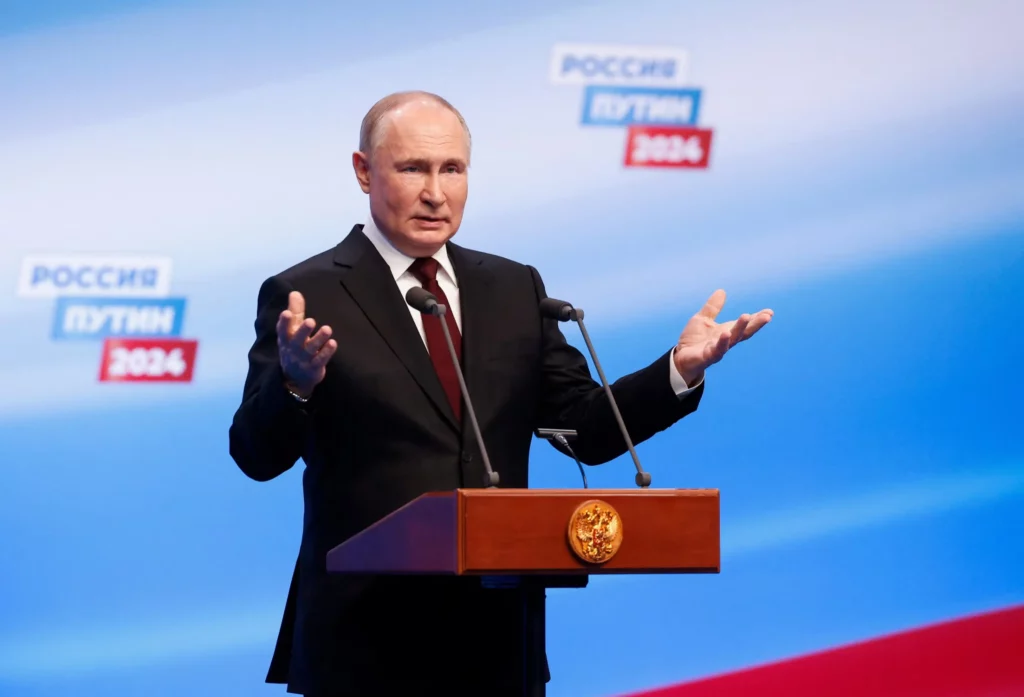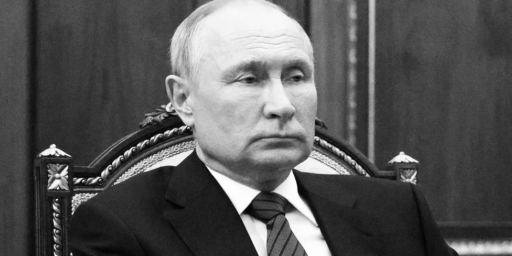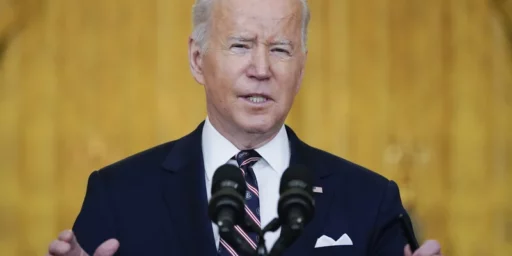Putin Wins Again!
He's on a winning streak not seen since Stalin.

NYT (“Behind Putin’s Potemkin Vote, Real Support. But No Other Choices.“):
The Kremlin stage-managed Russia’s presidential vote over the weekend to send a singular message at home and abroad: that President Vladimir V. Putin’s support is overwhelming and unshakable, despite or even because of his war against Ukraine.
From the moment the preliminary results first flashed across state television late Sunday, the authorities left no room for misinterpretation. Mr. Putin, they said, won more than 87 percent of the vote, his closest competitor just 4 percent. It had all the hallmarks of an authoritarian Potemkin plebiscite.
The Kremlin may have felt more comfortable orchestrating such a large margin of victory because Mr. Putin’s approval rating has climbed during the war in independent polls, owing to a rally-around-the flag effect and optimism about the Russian economy. The Levada Center, an independent pollster, reported last month that 86 percent of Russians approved of Mr. Putin, his highest rating in more than seven years.
But while the figures may suggest unabiding support for Mr. Putin and his agenda across Russia, the situation is more complex than the numbers convey. The leader of one opposition research group in Moscow has argued that backing for Mr. Putin is actually far more brittle than simple approval numbers suggest.
“The numbers we get on polls from Russia don’t mean what people think they mean,” said Aleksei Minyailo, a Moscow-based opposition activist and co-founder of a research project called Chronicles, which has been polling Russians in recent months. “Because Russia is not an electoral democracy but a wartime dictatorship.”
The Times’ coverage is representative:
- WaPo, “Putin basks in electoral victory that was never in doubt even as Russians quietly protest“
- CNN, “Putin extends one-man rule in Russia after stage-managed election devoid of credible opposition“
- WSJ, “Putin Wins Election That Had Only One Possible Outcome“
There was a time when the American press credulously treated Russian elections as though they were real. And, no, I’m not talking about the brief period in which Boris Yeltsin was more-or-less the democratic leader of a French-style system. During the fake presidency of Dmitry Medvedev (May 2008-May 2012), when Putin stepped aside because he was term-limited, pretty much everyone pretended that the transition was real and that Putin, who instead was appointed prime minister, was no longer making policy decisions. Even Fox News (“Putin secures 5th term as Russian president in the election with no real opposition, addresses Navalny death“) now acknowledges the obvious.
This makes columns like Ishaan Tharoor’s “Russia’s farce election sums up a grim moment in global democracy” something of a head-scratcher.
Three days of voting, staggered across 11 time zones and a vast stretch of the Earth, could only lead to one outcome: An emphatic reelection victory for Russian President Vladimir Putin. It was always clear that the Kremlin would exult in the landslide mandate accorded to Putin, who “contested” the vote against a handful of ciphers allowed to be presidential candidates. By Sunday evening, election officials announced a preliminary tally of that preordained result, reporting that Putin had won more than 87 percent of the vote, with three-fourths of the vote counted. State figures suggested a greater turnout than the previous presidential vote in 2018.
Even then, exiled watchdog groups reported episodes of ballot-stuffing, voter intimidation at some polling stations and other attempts at manipulation, including the alleged busing of Putin supporters to vote multiple times at different locations. In areas of Ukraine occupied and illegally annexed by Russia, observers recounted how local authorities coerced people to participate in the election at “gunpoint.”
Election officials were walking around the occupied town of Novomykolaivka, a local official, who has since fled to other areas of Ukraine, told my colleagues, “in a brigade accompanied by an armed soldier. He was carrying a weapon, so it was a threat, not verbal, but in fact it was a threat of violence.”
Thousands of Russians in big cities attempted to make their displeasure known at both the nature of Putin’s regime and the ongoing war in Ukraine by going to vote at noon Sunday — a symbolic act of solidarity with the late pro-democracy activist Alexei Navalny, who had long called for fairer and freer elections in Russia before dying in captivity. Many spoiled their ballots. Russian authorities clamped down on other forms of dissent and tried to encourage voters to go to the polls ahead of the designated protest time.
That need to cling to hope is profound and meaningful for anybody struggling under an authoritarian regime. And, on a global scale, the need to locate such hope is becoming more necessary. As already outlined in Today’s WorldView, the bumper year of elections worldwide in 2024 comes at a moment of “democratic recession,” with the health of democracies around the world in notable decline.
A new study this month from the V-Dem Institute, a leading center for the analysis of comparative politics at Sweden’s University of Gothenburg, laid out some of the worrying macro-indicators. The institute’s annual Democracy Report measures a democracy using a multidimensional data set based on a number of factors, including the civil liberties and freedoms afforded to all citizens, and their ability to participate in fair elections.
[…]
These findings dovetail with a gloomy Pew survey published last month. In polls put to respondents in a spread of 24 countries, researchers found that enthusiasm for “representative democracy” has slipped since 2017, when the organization conducted a similar survey. It found that a median 59 percent respondents were “dissatisfied with how their democracy is functioning,” and that close to three-quarters of those polled in countries as disparate as Argentina, Germany and Kenya felt that elected officials “don’t care” what they think. More than 40 percent said no political party in their country adequately reflects their views.
The survey found growing interest in alternatives to rule by elected officials, including an embrace of technocracy or even an autocratic strongman. “In 13 countries, a quarter or more of those surveyed think a system in which a strong leader can make decisions without interference from parliament or the courts is a good form of government,” noted Pew. “In four of the eight middle-income nations in the study, at least half of respondents express this view.”
Democratic backsliding is indeed a very real trend. Indeed, a colleague of mine, who grew up in Turkey, offers an elective on it. But it’s weird to lump Putin’s Russia, which hasn’t been a democracy in any meaningful sense in a long time,* into that camp.
Maybe we can chalk this up to the columnist’s dilemma of having to constantly find something to write about and needing a news hook around which to build it. But doing so in this instance sends the wrong impression to readers.
____________________
*Indeed, there is a debate among specialists as to whether the brief period between Gorbachev and Putin even qualifies. See, for example, Michael McFaul’s “Russia’s Road to Autocracy” and Maria Snegovaya’s “Why Russia’s Democracy Never Began,” both in relatively recent issues of the Journal of Democracy.






Get used to it. If Trump wins in 2024, this is what 2028 will look like here.
I have a vague memory pf Krushchev getting over 90% of the vote and wondering why anyone bothered to go to the polls.
I barely believe polls in this country, polls taken in an autocracy where referring to a war as ‘a war’ can get you arrested are not going to be reliable.
Say you’re a Russian. Your phone rings. You don’t recognize the number. You decide eh, I’ll answer anyway, I’m bored. Then a voice asks you what you think of Putin. Puh-leeze.
And the election is, of course, a joke.
@Michael Reynolds:
Omg the amount of times I’ve seen supposedly intelligent people cite polls of Russian people as evidence of Putin’s popularity, with matter-of-fact credulity.
I be like…are they f***g serious? Polling Americans is a suspect endeavor, and we don’t live under a 24+ year dictatorship where you can be arrested for *liking* a post critical of the dictator. Y’all still taking surveys of Russians at face value? For real? How old are we?